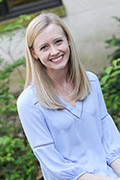 Nell Henson ’18 has won the 2018 Nagareda Prize for her Vanderbilt Law Review Note, “A Taste of Their Own Medicine: Examining the Admissibility of Experts’ Prior Malpractice under the Federal Rules of Evidence.”
Nell Henson ’18 has won the 2018 Nagareda Prize for her Vanderbilt Law Review Note, “A Taste of Their Own Medicine: Examining the Admissibility of Experts’ Prior Malpractice under the Federal Rules of Evidence.”
The award, sponsored by the Branstetter Litigation and Dispute Resolution Program, was announced by the program’s director, Tracey George, who holds the Charles B. Cox III and Lucy D. Cox Family Chair in Law and Liberty. The annual prize, which honors the late Richard Nagareda, the first director of the Branstetter Program, recognizes the best scholarly paper in the fields of litigation and dispute resolution written by a member of the current graduating class.
Henson’s article addresses the thorny issue of whether evidence of prior malpractice by medical experts testifying before a jury on behalf of a plaintiff or defendant in a malpractice trial is admissible under the Federal Rules of Evidence. “Courts exclude this evidence when offered against defendant doctors,” Henson said. “But they disagree about whether such evidence is admissible against expert witnesses hired to testify on behalf of the plaintiff or defendant in such cases.”
Henson asserts that such testimony against expert witnesses should be admissible to help the jury evaluate their testimony. “Their credibility and competency influence the jury’s decision,” she said. Allowing adverse testimony against expert witnesses, she contends, has an important advantage: A better-informed jury is more likely to reach a just verdict.
However, Henson concludes that presenting such evidence currently does violate the Federal Rules of Evidence. In her article, she proposes that the Rules of Evidence be revised to include an “expert exception” that would allow opposing attorneys to present evidence, such as prior malpractice judgments against an expert witness, that might affect jurors’ assessment of that witness’s credibility.
“The importance of expert witnesses in medical malpractice lawsuits can’t be understated,” she said. “These cases ultimately come down to a ‘battle of the experts,’ with the jury trying to decide which expert they believe. Knowing that a doctor testifying as an expert witness has herself faced a malpractice judgment can help a jury make an informed decision.”
Although Henson focuses specifically on medical malpractice cases in her paper, she believes her proposal would also benefit juries in other trials where expert witnesses are hired to testify. “Forensics and vocational experts could also present problems, such as questionable judicial review of their professional credentials or selection bias by attorneys, which distorts the representative sample of opinions the jury considers,” she said. “This exception has a wide-reaching potential to improve the jury’s decision making in other complex cases where experts are used.”
Henson drew the idea for her Note from summer work on medical malpractice cases and her Evidence class, taught by Professor Edward Cheng. “Nell’s Note operates at the tricky intersection between expert evidence and character evidence,” Cheng said. “She addresses the important question of what kinds of information lay juries can use to assess the credibility and qualifications of an expert witness. She identifies and then seeks to resolve an inconsistency in how courts treat such prior malpractice evidence, and her close parsing of the Rules of Evidence and their underlying purposes is compelling.”
Henson served as a managing editor of the Vanderbilt Law Review and won the Bass Berry & Sims Moot Court competition with her partner, Zoe Ben-Oren ’18, in 2017. She plans to join King & Spalding in Atlanta after graduation.